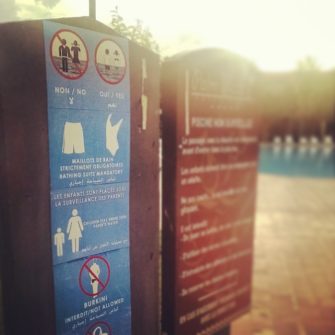
Comparative religious ethics, as a subfield of religious studies and as a method of inquiry, assumes that the categories of both religion and ethics apply across cultures. Is our assumption of the possibility of comparison across cultures with regard to religion or ethics valid? In its purest form, comparative religious ethics examines ethics in various religious traditions and draws similarities and differences among them. In its practical form, comparative religious ethics typically involves comparison between Christianity and a non-Christian tradition, or the study of ethics in minority and non-Christian traditions. Comparative religious ethicists may compare influential figures in different traditions, for example as Lee Yearley does in Mencius and Aquinas (1990); explore an important theme in a non-Christian tradition, as William LaFleur does in Liquid Life: Abortion and Buddhism in Japan (1994); or examine an idea, such as human rights, that has been adopted in multiple traditions, as I do in The Rights of God (2007). In any case, when scholars engage in comparative religious ethics, they do so with the understanding that both religion and ethics are categories that exist across traditions.
Decolonizing Religion and Ethics
Work on the theme of decolonization by scholars such as Christopher M. Driscoll and Monica R. Miller, Kathryn Lofton, and Tomoko Masuzawa questions the integrity of the category of religion, and by extension, of religious ethics. Endeavors to decolonize religion unearth the many ways in which the study of religion has contributed to, if not created, the conditions for oppression. The origins of the idea of religion are in European Christianity, which took the primacy of scripture and the centrality of humankind—especially white men—as archetypical of a valid belief system. Beliefs and practices that did not fit neatly into this mold were classified by scholars and clergy as inferior, less highly developed, or even evil. As such, these descriptions of other traditions provided justification for the subjugation, colonization, and conversion of Asians, Africans, indigenous peoples, and other groups at the hands of “enlightened” European Christians.

The very existence of comparative religious ethics—indeed of religious studies as a discipline altogether—has grown out of a deeply unjust European colonialist legacy. Within the study of ethics outside the modern study of religion, the process of decolonization is perhaps a bit more muddled. Ethics has a much longer history than the study of religion, dating at least as far back to the ancient Greeks, whose meditations on concepts of the good, the right, and virtue influenced countless traditions, not just Christianity. One would be hard pressed to find any community that lacks some notion of preferred behaviors, acceptable social structures, and customary ways of relating to other members of the society. If we consider societal laws to be a type of ethics, in that laws approximate the dominant ethical norms of a given community, then the idea of ethics dates back even further to at least the ancient Mesopotamians, the laws of Moses, and the laws of Manu, among others. Decolonizing ethics and the law would likely take on a different form than decolonizing religion. Of course, ideas of ethics and the law have—like religions—been utilized by imperialists to oppress non-Christian subjects, but ethics and the law likely existed as discrete topics in many cultures prior to colonization.
Given this, what are our options with regard to the future of comparative religious ethics? First, we could abandon the discipline altogether given its compromised origins. Second, we could continue to carry on with our research as we have previously and ignore the efforts to decolonize religious studies. Third, we could acknowledge the validity of efforts to decolonize religious studies and make adjustments accordingly.
Option 1: Abandoning Religious Studies
The first option, to abandon religious studies altogether, is simply unrealistic, at least in the foreseeable future in the United States. While it is the cleanest theoretically of the three options, the academic study of religion is deeply embedded into the structure of colleges, universities, and research institutions across the globe. Of course, universities and colleges do eliminate departments, but usually as the result of financial distress; and this strategy is often met with backlash from students, faculty, and alumni. An alternative option, as described by Birgit Meyer, is to follow the model in the Netherlands, where public universities folded theology faculty into humanities departments, and then replaced theology with religious studies. While this does not erase religious studies altogether, this does more to place religious studies within a larger interdisciplinary context. As such, religious studies becomes part of an academic community that considers equally relevant the knowledge produced in history, literature, philosophy, languages, and other humanistic disciplines.
The elimination of religious studies as a discipline, however, does not provide strategies for analyzing a massive body of literature about religions. We have libraries, both physical and online, full of books, essays, articles, as well as films, movies, and documentaries all dealing with the theme of religion. The category of religion as a means to describe peoples has become part of polling statistics, the national census, and international research data. Religion has been incorporated into national and international legal structures, most notably in those structures’ protection of freedom of religion. Although the origins of the idea of religion are rooted in unjust colonial practices, as Nelson Maldonado-Torres has described, how would we possibly dismantle the juggernaut that religion has now become? To do so would present an impossible task, and would not necessarily be a wise one to take up. Given that religious minorities in many countries may now turn to legal systems to seek protection, doing away with religion as part of a larger decolonization strategy could have the ironic and unintended consequence of jeopardizing the survival of marginalized religious communities. Legal systems, of course, are not without their own flaws when it comes to the use of religion as a category. As Winnifred Sullivan and others have described, religious freedom is a highly politicized concept that dominant parties have wielded to protect their own interests at the expense of weaker minorities, both domestically and internationally. As Sullivan and others note, however, there is no easy solution to this problem. There are some religious minorities that have definitely benefited from such protective laws, including—as I describe below—Muslim women in France who had been penalized for wearing “burkinis” until France’s highest court, the Conseil d’État, determined that burkini bans violated fundamental freedoms.
Option 2: Ignoring Decolonialism
The second option would be to carry on with our research and teaching as if decolonialism had no direct impact upon scholarship in comparative religious ethics. Many of us—even if we do not or have not specifically addressed decolonization in our scholarship or teaching—are sympathetic to the larger project. In particular, comparative religious ethicists are 1) keenly aware of, and try to avoid, a hierarchy of beliefs and practices based upon an inherited notion of the supremacy of Christianity; and 2) supportive of research that investigates non-Christian and minority traditions as rich sources of ethical knowledge.

If we consider the origins of contemporary comparative religious ethics as emerging from the 1978 publication of David Little and Barney Twiss’ Comparative Religious Ethics: A New Method, the work done in the field has been sensitive to concerns about stigmatizing the cultures and traditions of the colonized, oppressed, and marginalized, and committed to elevating the status of non-Christian traditions as serious sources of ethical material. Comparative Religious Ethics, although not without fault, takes seriously the structures of moral reasoning found not just in Christianity, but also in the Navajo and Theravada Buddhist traditions. There is no discernable motivation to rank these traditions in terms of their moral superiority. There are clear attempts to show how these traditions share some similarities concerning “other-regarding” norms, as well as to show how these traditions differ from each other.
Applying a decolonial lens to Comparative Religious Ethics—as well as to other works that have since emerged from the discipline—would help to uncover some of the assumptions about the categories used in ethical analysis. The commonly accepted definition of ethics as other-regarding, for example, can be scrutinized as a perspective that requires first, the separation between self and other, and second, that other-regarding actions are praiseworthy, rather than assumed. In one of the early critiques of Comparative Religious Ethics, Donald Swearer points out that the Buddhist concept of no-self presents significant complications to a notion of ethics in which individual persons exist as discrete beings. Similar critiques in religious ethics have been previously offered along similar lines by feminist and womanist scholars such as Katie G. Cannon, Deidre Nicole Green, and Virginia Held.
Option 3: Incorporating Decolonization
The third option, to acknowledge the validity of efforts to decolonize religion and adjust our approaches to comparative religious ethics, is not just practical, but may also improve our methodology in comparative religious ethics. Although the field—like so many other academic disciplines in the humanities and social sciences—has been affected by the self-reflexive turn advocated for by Pierre Bourdieu, comparative religious ethics has thus far not been explicitly concerned about its broader origins in colonial practices. What might scholarship in comparative religious ethics that addresses decolonialism look like?
First, work in comparative religious ethics ought to make explicit whether the object of inquiry—whether it be religious clothing as Elizabeth Bucar discusses in Pious Fashion: How Muslim Women Dress, or just war as explained by John Kelsay in Arguing the Just War in Islam—exists from the perspective of the practitioners of the tradition itself. Perhaps one of the most egregious missteps ethicists can make is to force the moral relevance of issues onto another culture. The heated debates in France over Muslim women’s clothing, for example, have revealed how divisive and oppressive traditional French norms about women’s appearance can be. French “burkini” bans that essentially required Muslim women to reveal their bodies when sun-bathing were not only unnecessary from a security perspective—this had been the prevailing argument against the face-covering burka—but rightly condemned and eventually overturned by higher courts for violating civil liberties, including religious freedom.

Second, we ought not to assume that simply because a specific word or phrase does not exist in another linguistic culture, that the idea does not have resonance there. The concept of human rights, for example, may have been borne out of North American and European legal traditions, but has found audiences in communities around the world. The clear majority of cultures support human rights as a general principle, even if violations of human rights continue to occur. The process by which representatives from highly diverse cultural backgrounds discussed, debated, and then created the Universal Declaration of Human Rights reveals how dialogue can lead to a shared understanding of important issues. Hans Georg Gadamer’s term Horizontversmelzung (“fusion of horizons”) captures this phenomenon well. Horizontversmelzung describes an understanding that takes place among participants in dialogue, whereby each person standing at a distinct vantage point is nonetheless capable of sharing a metaphorical horizon with others, who likewise stand at their own distinct vantage points.
Third, recognizing the full humanity which should be accorded to subjugated peoples means insisting that they be recognized as intellectual and moral agents, and not be objectified as carefully preserved museum pieces. As with the interlocutors from Gadamer’s dialogues, people regardless of their location are agents who may themselves initiate exchanges with others, agitate for change and progress, and, unfortunately, engage in oppressive practices both within and outside their communities. Work in comparative religious ethics can illuminate the ways in which people from various communities have applied and responded to colonial pressures, as well as the ethical implications of using religion to further and to protest the aims of empire.
Conclusion

The application of decolonial theory to comparative religious ethics would emphasize the necessity of bringing forth distinct voices and perspectives from non-Christian and non-European traditions to represent ideas on their own terms, rather than mediated through the theories and categories of colonialism. This requires the inclusion of theoretical frameworks developed by peoples, both from the past and contemporaries, whose worldviews have been shaped by and are critical of colonial histories. Although comparative religious ethicists take seriously the ideas advocated by thinkers from multiple traditions, many of us rely almost exclusively upon frameworks informed by European and North American male scholars—Bourdieu, Durkheim, Habermas, Marx, Rawls, Weber, and Gadamer, among others. This is not, of course, to condemn such influential scholarship, but rather, to press the necessity of evaluating and incorporating alternative methodologies relevant to comparison. How might the works of Frantz Fanon, Aníbal Quijano, Sylvia Wynter, and other thinkers help us to push and to question the boundaries of comparative religious ethics? The responses to this question will likely engender new directions in comparative religious ethics by interrogating dominant modes of thinking in the field and by expanding discussions about the environment, the economy, race and ethnicity, and gender.

